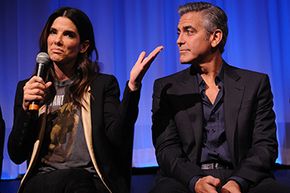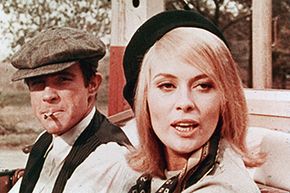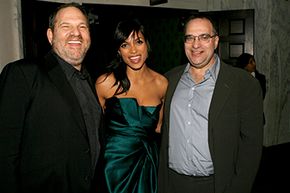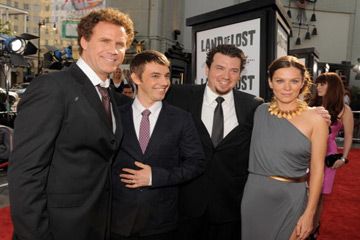There are many fun examples of famous blockbuster films that studios claim are still in the red: Peter Jackson's wildly successful "The Lord of the Rings" trilogy is said to be a net loser despite earning nearly $3 billion at the box office. The original "Batman" still shows a deficit of $36 million despite earning $411 million. (Way back in 1991, the Los Angeles Times called it "the movie that may never earn a profit," and, more than 25 years later, the prediction has apparently come true [source: McDougal].) Even a small movie such as "My Big Fat Greek Wedding," which cost only $6 million to make and earned more than $350 million, is said to have cost the studio $20 million in losses [source: Rowles].
Not everyone in Hollywood supports the local accounting practices, however. Over the years, there have been signs that the studios' clever tricks would catch up with them.
Filmmaker Michael Moore sued producers Harvey and Bob Weinstein over profits for his hugely successful 2004 documentary, "Fahrenheit 9/11." The movie grossed more than $228 million in theaters, and possibly twice that, considering DVD, television and other sales. Moore said he was supposed to get 50 percent of the profits; the Weinsteins said he was a profit participant. Moore earned $19.8 million from his film and sued for an additional $2.7 million in profits [Source: Garrahan]. The parties settled out of court in 2012 for an undisclosed amount.
Writer Art Buchwald won $900,000 from Paramount for his work writing the story treatment that inspired the 1988 Eddie Murphy comedy "Coming to America." The movie had made $288 million when Buchwald sued in 1990, but it still had not seen a net profit.
Hollywood accounting extends beyond movies to television, videos, books, music and other projects designed to hide net profits. Actor Don Johnson sued the company Rysher Entertainment in 2010 over his share of profits from the show "Nash Bridges." The company claimed it was so expensive to produce, that the show was left $40 million in the red. The jury disagreed and awarded Johnson more than $23 million, which the judge increased to $50 million to account for interest. The settlement was eventually reduced on appeal. In the end, Johnson is said to have received $19 million [source: Gardner].
And in 2008, Deborah Gregory, author of the popular young-adult fiction series "Cheetah Girls," complained that she had never seen a penny of the 4 percent net profits she was promised by Disney from the movies, DVDs and merchandising surrounding her book.
Despite the grumbling, there are no real signs that Hollywood accounting practices will change anytime soon. David Geffen, Jeffrey Katzenberg and Steven Spielberg founded the studio Dreamworks SKG in the mid-1990s with a plan to really change how studio profits were shared [source: Abelson]. But Geffen has since departed, and the studio has had a tough time keeping up with cash flow [source: Epstein]. Today, the studio relies on Disney for most of its distribution, and reforming Hollywood accounting no longer seems to get a mention as part of the Dreamworks story [source: Dreamworks].
Indeed, Hollywood outsiders would be hard-pressed to find many vocal critics from within the Hollywood accounting system. But if you follow insider podcasts and interviews closely, you can find stories like that of Scott Derrickson, the director of "The Exorcism of Emily Rose." In an interview with fellow director Kevin Smith, Derrickson explained how his net profit deal for directing the hit horror film was worth less than a ham sandwich [source: Masnick]. Regardless of whether the system can be changed, it should be ready for its close up.





